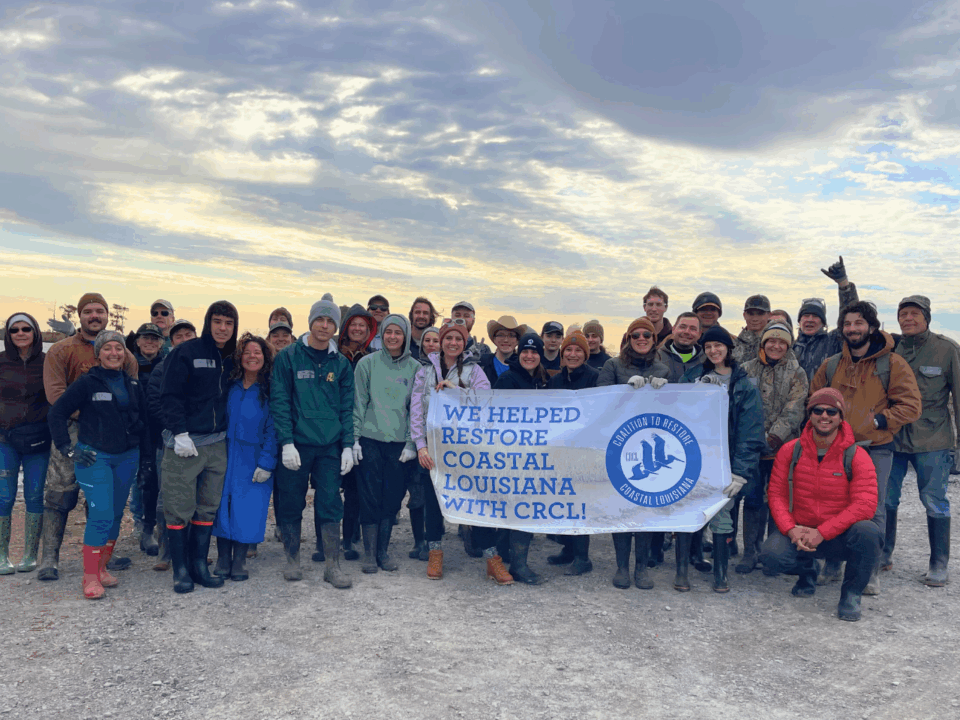When it comes to Louisiana’s coastal future, the Coalition to Restore Coastal Louisiana (CRCL) isn’t just on the front lines; They’ve been leading the charge for more than 35 years. CRCL was founded in 1988 and was the first statewide nonprofit organization dedicated to addressing the devastating problem of coastal land loss in Louisiana.
“We were founded at a time when I don’t think everybody recognized that coastal land loss was occurring or that it was a big problem for individuals, industries, and communities,” says James Karst, Communications Director at CRCL. “And I think they also didn’t really understand that there were things that we could do about it.”
CRCL was the first statewide nonprofit dedicated to this critical issue, and today, its work is more urgent than ever. Through a unique blend of on-the-ground restoration, environmental education, community outreach, and advocacy at every level of government, CRCL is leading efforts to both protect and rebuild Louisiana’s disappearing coast.
RESTORATION AND A SIDE OF OYSTERS, PLEASE!
Among their most impactful programs is the Oyster Shell Recycling Program (the only one of its kind in the state!). Since 2014, CRCL has collected over 13 million pounds of used oyster shells from partner restaurants in Baton Rouge and New Orleans and returned them to the water to build living oyster reefs. “We work with restaurants, and we take their oyster shells, which they used to send to landfills, and we put it back into the water instead, where it can do many good things,” Karst explains. These reefs help reduce shoreline erosion, provide habitat for marine life, and even support Louisiana’s oyster industry by giving baby oysters a place to grow.
Another vital project is CRCL’s large-scale tree and marsh grass planting initiative, which restores critical habitats across the coast. Tens of thousands of trees—especially bald cypress—are currently being planted in areas like the Maurepas Swamp, the Central Wetlands near New Orleans’ Lower Ninth Ward, and St. Bernard Parish. “It used to be a forest, and it is going to be a forest again,” says Karst. CRCL is leading the effort and working with volunteers to plant a huge number of trees over the next four years. “It’s really gratifying work,” Karst adds.
WHY COASTAL LOSS AFFECTS US ALL
The urgency of coastal restoration goes far beyond protecting wetlands for wildlife or recreation. It’s about the safety and sustainability of communities across the state. “We want people to understand that preserving and restoring coastal wetlands affects people who live inland, not [just] people who live right on the water,” Karst says. “There was a study that determined the Gulf is 10 miles closer to the city of Houma (now) than it was in the 1930s… If it’s 10 miles closer to Houma, it’s also 10 miles closer to New Orleans; It’s 10 miles closer to Baton Rouge; It’s 10 miles closer to Shreveport… It affects all of us.”
A TRUE COALITION FOR CHANGE
CRCL also makes it easy for Louisianians of all ages to get involved. Whether it’s collecting cypress seeds, volunteering to build oyster reefs, donating Christmas trees, or even attending one of their community events like the annual Shellabration at the Audubon Zoo, there are countless ways to support the cause. “[You] could simply go to a restaurant and eat a dozen oysters, and [you’re] helping to preserve the coast,” Karst says.
Their mission also includes education and leadership development. CRCL’s Future Coastal Leaders Program engages college students, while the Coastal Leadership Institute offers professional development in environmental strategy and advocacy. And through the Coastal Stewardship Awards, CRCL recognizes individuals and groups who’ve made outstanding contributions to the fight for Louisiana’s coast.
What truly makes CRCL stand out is its collaborative, community-focused approach. “We really lean into the coalition part of our name,” Karst says. CRCL brings together a truly diverse group of people: nonprofits, government agencies, restaurants, volunteers, and even the DJs helping raise money at parties. “Nobody wants to see Louisiana wash away, and we want everybody to help us preserve it,”
James concludes.
To learn more about CRCL, volunteer, or support their mission, visit crcl.org. From sharing a social media post to planting a cypress tree, every action counts when it comes to saving Louisiana’s coast, because it belongs to all of us.





